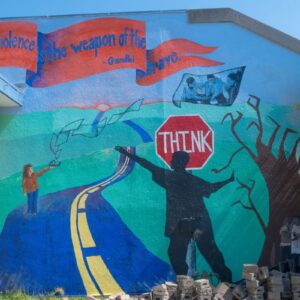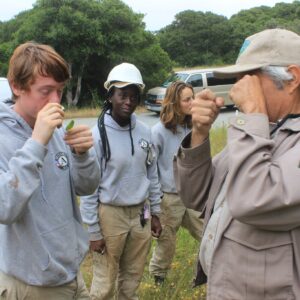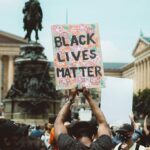
As legal challenges to a controversial executive order unfold, nonprofits—especially those serving immigrants and mixed-status families—face an urgent call to action.
At stake is birthright citizenship, a constitutional right enshrined in the Fourteenth Amendment. If Executive Order 14160, issued by the Trump administration in January, is upheld, the consequences will ripple across communities, creating a new class of children who have no state to call home, and the threats to civil rights protections will continue to pervade the country. Even more, one of the nation’s most vulnerable populations will experience an unprecedented attack against their constitutional and human rights.
NPQ recently spoke with Raul Pinto, deputy legal director of transparency for the American Immigration Council, who urged nonprofit organizations to prepare now, not only for potential litigation but also for the emotional and humanitarian toll on the communities they seek to help.
Widespread Consequences
Executive Order 14160 aims to end birthright citizenship for children born in the United States to parents without permanent legal status. The move directly challenges the Fourteenth Amendment, which states that anyone born or naturalized in the United States is a citizen of this country and of the state where they reside.
“You are creating a subclass of children, who technically don’t have a country to call home.”
Despite the Trump administration’s push, multiple courts—including judges appointed by Republican presidents—have already blocked enforcement of the executive order, calling it unconstitutional. Yet the issue is far from resolved.
Recently, the Supreme Court limited the use of nationwide injunctions, therefore allowing state-by-state interpretations of constitutional protections. So while some courts have halted the executive order, its future remains in legal limbo.
If the Supreme Court ultimately finds the executive order constitutional, Pinto told NPQ that it will create a fragmented system where rights depend on geography, therefore violating the core principle of equal protection under the law. And while media narratives often center on undocumented immigrants, Pinto stressed that the scope of this executive order will affect immigrants with legal status, too.
“It’s broader than saying that it’s only going to impact undocumented immigrants,” he said. “If you have, for example, someone who is unlawfully present and someone who is on a tourist visa or [has] Temporary Protected Status, it could impact them as well.”
In short, any child born to a parent without permanent lawful status could be denied citizenship, even if one parent holds temporary status or is lawfully present under a different visa category. This puts children born on US soil at risk of statelessness: a violation of international human rights standards.
Nonprofits must also be leaders in educating the public and their communities.
But the most direct and devastating impact would likely be on mixed-status families—those where US citizens and noncitizens live under the same roof.
“To say that it would be catastrophic is putting it mildly,” Pinto said. “This would create a class of individuals, a class of children, who are born in the United States but don’t have any of the privileges of United States citizens. You are creating a subclass of children, who technically don’t have a country to call home.”
Such a policy would remove basic protections, ranging from access to education and healthcare to protection from deportation. Children born in this country could become vulnerable to removal at any time, even if they’ve never lived in another country aside from the United States.
The Role of Nonprofits
Organizations focused on immigrant rights, and the broader nonprofit sector have a crucial role to play in defending birthright citizenship and supporting affected communities. Pinto noted that it’s important to monitor litigation closely, and to stay updated on legal developments surrounding this executive order.
“Immigrant rights groups have to be very, very vigilant about how this litigation progresses, and then be at the ready to help individuals who may be directly impacted,” Pinto said.
Moreover, organizations may need to identify individuals or families who could be affected and file lawsuits on their behalf. Pinto urged that nonprofits, “leverage resources, and bring lawsuits that can obtain as wide a relief as possible.”
“We must be ready to protect those children, and the Constitution that has always promised them citizenship—always.”
Nonprofits must also be leaders in educating the public and their communities. “Public education is going to be the number one rule,” Pinto said. “Making sure that people know that the order has not been implemented yet, and that no one has lost birthright citizenship yet, is key.”
Because the Supreme Court left open the possibility of state-level challenges, state governments could play a vital role in stopping the implementation of this executive order. Nonprofits can and should work with advocacy partners and attorneys general to file state-based lawsuits if needed. While the issue may seem legalistic, Pinto emphasized the importance of visible public resistance.
“Courts must be aware of what the constituency is feeling,” he said. “Ensuring that people’s voices are heard, particularly on an issue that is as important as this, is going to be crucial.”
“Not Impossible”
If upheld, this executive order could strip children born in the United States of their legal identity and stability. The policy would essentially reclassify these children as undocumented and therefore strip them of protections to which they have been entitled since birth.
This executive order could also trigger a chilling effect across immigrant communities, leading families to avoid hospitals, schools, and public services for fear that their US-born children’s citizenship status could be questioned. Though many experts believe the order will be struck down, Pinto cautioned against complacency.
“I wouldn’t put it past this court to see an alternate interpretation,” he said. “Given this court’s lack of recognition for other types of Supreme Court precedents…I do see it as unlikely, but not impossible.”
That small window of possibility requires vigilance from all sectors. From legal advocates, nonprofit service providers, community organizers, to everyday people—all must be on guard. Even if birthright citizenship ultimately survives this attack, the ripple effects of fear, confusion, and political messaging may persist. Pinto reiterated that nonprofits must be proactive—not reactive.
“At the end of the day, this could impact real people, it could impact everyone,” Pinto said. “We must be ready to protect those children, and the Constitution that has always promised them citizenship—always.”
For More on This Topic
On the Frontlines: Lessons from New York’s Immigrant Defense Project
What to the Immigrant Is the Fourth of July?
Resiliency Strategies for Nonprofits in Times of Political and Financial Instability













